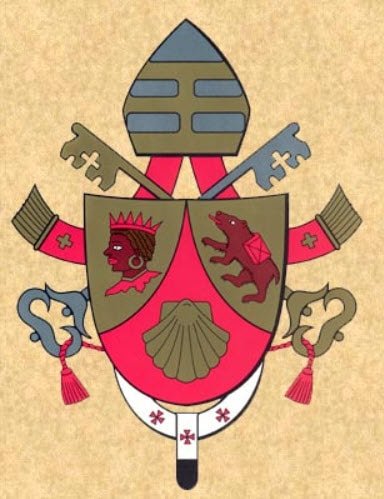Apostolic Palace of Castelgandolfo – Sala Svizzeri Friday September 26, 2008
Venerable Brothers in the Episcopate and in the Priesthood, dear brothers and sisters!
I welcome you with joy today, on the occasion of the world meeting of Retrouvaille Movement. I greet you all, couples and presbyters, together with the international leaders of this association which for over 30 years works with great dedication to the service of couples experiencing difficulties in their relationship. I greet in particular Mgr Giuseppe Anfossi, President of the Episcopal Commission of the CEI for the Family and Life, and I thank him for his kind expressions and for having outlined the aim of your movement.
Dear friends, I was impressed by your experience which puts you in touch with families affected by the crisis of marriage. As I reflect on your activity, once again I have recognized the “finger” of God, that is the action of the Holy Spirit which inspires in the Church answers to the needs and emergencies of each time. Certainly in our days a much felt emergency is the one concerning separations and divorce. The Providence inspired the intuition of the Canadian couple Guy and Jeannine Beland in 1977, to help couples in crisis through a specific program which aims at rebuilding their relationship not as an alternative to the psychological therapies but through a separate and specific itinerary. In fact, you are not professionals; you are married couples who have yourselves lived these same difficulties and overcome them through God’s grace and the support of Retrouvaille and have therefore felt the desire and the joy to put your experience at the service of others. In your midst there are several priests who accompany the couples on their journey, breaking for them the Word and the Bread of Life. “Freely you have received, freely you give” (Mt 10:8): it is to these words of Jesus to his disciples that you constantly refer to.
As your experience proves, the conjugal crisis –we speak here of grave and serious crises—constitutes a two-faced reality. On one side it appears, especially in its most painful phase, as a failure, as a proof that the dream is over or it became a nightmare and, regretfully, “there is nothing else to do”. This is the negative face. But there is often another face, unknown to us yet seen by God. Every crisis in fact, as nature itself teaches us, is transition to another phase of life. If this happens automatically in the inferior creatures, in man this calls for freedom, will, and, therefore, a hope bigger than desperation. In their darkest moments couples have lost hope and therefore they need someone who guards it, they need some “us”, a company of friends who, with extreme respect but also with a sincere will of good, are ready to share part of their hope with those who have lost it. And this not in a wishful and sentimental way, but in a realistic and organized way. Thus, at the moment of the breaking up you become the concrete possibility for the couple to have a positive point of reference to which they can entrust themselves in their despair. In fact, when their relationship breaks, couples fall in deep solitude both individually and as a couples. They lose the horizon of their communion with God, with others and with the Church. At this point your program offers the “hook” so that they may not be totally lost and may gradually climb over the cliff. I love to think of you as custodians of a bigger hope for the couples who have lost it.
Crisis, then, as transition to growth. In this perspective we can read the story of Cana (John 2:1 -11). The Virgin Mary sees that the spouses “have no wine any longer” and tells it to Jesus. This lack of wine reminds us of the moment in which, in the life of a couple, love ends, the joy is exhausted and the enthusiasm for marriage deems. After Jesus changed water into wine people compliment the bridegroom because, they said, he had kept to that moment “the good wine”. This means that Jesus’ wine was better than the previous one. We know that this good wine is symbol of salvation, of the new nuptial covenant that Jesus came to establish with humankind. Christian marriage, even the poorest and weakest, is really the sacrament of this covenant and it can find, in humility, the courage to ask the Lord for help.
When a couple goes through hardship or, as your experience proves, is even separated, but entrust itself to Mary and turns to the One who made the two “one flesh”, this couple can be sure that its crisis, with God’s help, will become a transition of growth and its love will be purified, matured, strengthened. Only God can do this, but he wants to use his disciples as his coworkers to approach couples, listen to them and help them to rediscover the hidden treasure of marriage, the fire that was buried under the ashes. It is God who lights up and rekindles the flame, not in the way of the first falling in love but in a different way, deeper and more intense, yet always the same flame.
Dear friends who have chosen to serve others in such a delicate field, I assure you of my prayer so that this commitment of yours may not become a mere activity but may always remain a deep witness to God’s love. Yours is a service “against the wave”. Today, in fact when a couple is affected by crisis, finds many people ready to advise them to separate. Even to the couples married in the Lord people easily propose to divorce, forgetting that man cannot separate what God has united (cf. Mt 19:6; Mc 10:9). To accomplish this mission you too need to nourish continually your spiritual life, to put love in what you do so that, being in touch with difficult situations, your hope may not be exhausted or reduced to a mere technique. May the Holy Family of Nazareth help you, to which I entrust your service, especially in the most difficult cases. May Mary, Queen of the family, be at your side, as I give my Apostolic Blessing to you and all who are part of the Retrouvaille movement.
Pope Benedict XVI




